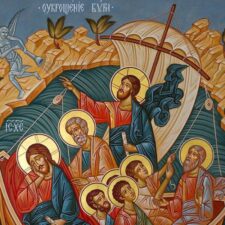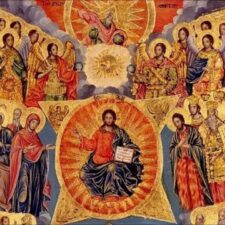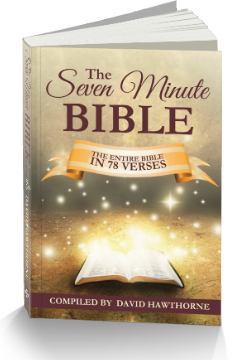David
In order for this book to be the “patristic consensus and criteria for Orthodoxy” that it purports to be, in spite of the fact that most of Orthodoxy believes differently on these issues, you only have to accept that:
-The Apostolic Canons refer indiscriminately to all heretics rather than just to the non-trinitarian heretics at the time they were written, against the position of Orthodoxy’s great medieval and modern canonists (Balsamon, Zonaras, Milas, etc.).
-You have to accept that St. Cyprian won the debate against St. Stephen regarding the reception of the heterodox, against the testimony of all the Church fathers who commented on it… Continue reading
Few books are as popular in sacramentally rigorist circles as the Pedalion, or The Rudder. It has an extremely high status, particularly among young new converts eager to learn all they can as quickly as they can about the Orthodox Faith. Often, zealous individuals will read portions of the Rudder and conclude that most Orthodox bishops “are doing it wrong” when receiving converts to the Church.
Yet, the Rudder is not universally received in the Orthodox Church nor is it an authoritative source for canon law. Neither is the peculiar and theologically modern interpretive lens it offers with the economia vs. akrivia theory which is… Continue reading
This last Sunday was the Feast of St. Luke. It was more than coincidence I think that I happened across a couple of verses from his Gospel that I look at very differently now than when I was a Protestant.
The verses in question are Luke 11:27-28, “As he said this, a woman in the crowd raised her voice and said to him, ‘Blessed is the womb that bore you, and the breasts that you nursed!’ But he said, ‘Blessed rather are those who hear the word of God and keep it!’”
In my Baptist days, I was taught that this cut across Roman Catholic… Continue reading
Started reading Amos last night. I decided to try something different and after reading the first chapter I went ahead and read the last chapter.
In chapter one, the prophet says he is going to give a prophecy against Jerusalem, the capital of the southern Jewish Kingdom. Yet I know from having studied Amos before that although he himself was a southerner, he had traveled north to the breakaway northern Kingdom to give oracles against them. Perhaps that means in God’s eyes there was still but one Kingdom? Or perhaps the northern Kingdom was too far gone and the southern still had time to repent?… Continue reading
Lenten Reading: On the Lord’s Prayer published by SVS Press.
We have extant three pre-Nicene treatises explaining the meaning of the petitions in the Our Father which the early Christians were encouraged to pray very often.
They are all in this volume: Tertullian, Origen, and St. Cyprian of Carthage.
One of the more enigmatic petitions in the Lord’s Prayer is, “Lead us not into temptation”. What does this mean?
How can God lead us into temptation when James said, “When temptations come, let no one say, “I am tempted by God,” because God cannot be tempted by evil and he himself tempts no one.” (James… Continue reading
Finished up Tobit the night before last. It is always a favorite book to reread because it is such a good story, it has a strong Christological spiritual sense, and it is one of the few places in the Scriptures where dogs are given a positive presence.
In most other places in the Bible, dogs get a bad rap. To be called a dog, a dog’s head, or a dead dog was an insult. Dogs were unclean and ate unclean things- sometimes even human carrion. Apparently, packs of feral dogs roamed in urban areas back then (Ps. 58:7, 15 and Ps. 21:17, 21 [that’s Psalms… Continue reading
A RC in one of my forums asked why Orthodox find Purgatory objectionable when we also pray for our departed:
One chief difference between the RC and Orthodox views on the Intermediate State is that we don’t go for the whole purgatorial fires thing.
In RC purgatory, forgiven sins are still being punished in some way, while in the Orthodox view forgiven sins are forgiven and the damage it caused is being healed in a place of refreshment. RC descriptions of purgatory, especially before Vatican 2 often presented it as horrible as hell but just with a time limit. We do not accept such a… Continue reading
The Book of Esther comes to us in two versions. There is the Hebrew Masoretic Text and the Greek Septuagint. The Greek is a bit longer as it has additions to the text, mostly in the form of prayers from Mordecai and Esther (as well as Mordecai’s prophetic dream in the first chapter and his remembering it in the last).
For centuries, the Jews debated whether Esther was even inspired Scripture because in the Hebrew version there are no explicit references to God. The Greek additions seem to be a conscious corrective to that lack.
I like having both versions in front of me. The… Continue reading
Finished Job again last night in my three-year plan through the Old Testament.
It is one of my favorite OT books although it raises as many questions as it answers. It is often pointed to as the Bible’s answer to the Problem of Evil but I think Habakkuk is a little more explicit about that. The answer to the POE in Job is basically, “The answer is above your head because you are finite and I, God, am not. You try running the universe for a day!”
Of the minutiae in the book, I have always thought it interesting that when Job was restored he… Continue reading
Two verses particularly stood out for me in today’s passage, “
For if when we were enemies we were reconciled to God through the death of His Son, much more, having been reconciled, we shall be saved by His life… But the free gift is not like the offense. For if by the one man’s offense many died, much more the grace of God and the gift by the grace of the one Man, Jesus Christ, abounded to many. And the gift is not like that which came through the one who sinned. For the judgment which came from one offense resulted in condemnation, but… Continue reading
Morning Gospel: Today, Jesus calms a storm that has His disciples terrified.
“23 𝐴𝑛𝑑 𝑤ℎ𝑒𝑛 ℎ𝑒 𝑤𝑎𝑠 𝑒𝑛𝑡𝑒𝑟𝑒𝑑 𝑖𝑛𝑡𝑜 𝑎 𝑠ℎ𝑖𝑝, ℎ𝑖𝑠 𝑑𝑖𝑠𝑐𝑖𝑝𝑙𝑒𝑠 𝑓𝑜𝑙𝑙𝑜𝑤𝑒𝑑 ℎ𝑖𝑚. 24 𝐴𝑛𝑑 𝑏𝑒ℎ𝑜𝑙𝑑, 𝑡ℎ𝑒𝑟𝑒 𝑎𝑟𝑜𝑠𝑒 𝑎 𝑔𝑟𝑒𝑎𝑡 𝑡𝑒𝑚𝑝𝑒𝑠𝑡 𝑖𝑛 𝑡ℎ𝑒 𝑠𝑒𝑎, 𝑖𝑛𝑠𝑜𝑚𝑢𝑐ℎ 𝑡ℎ𝑎𝑡 𝑡ℎ𝑒 𝑠ℎ𝑖𝑝 𝑤𝑎𝑠 𝑐𝑜𝑣𝑒𝑟𝑒𝑑 𝑤𝑖𝑡ℎ 𝑡ℎ𝑒 𝑤𝑎𝑣𝑒𝑠: 𝑏𝑢𝑡 ℎ𝑒 𝑤𝑎𝑠 𝑎𝑠𝑙𝑒𝑒𝑝. 25 𝐴𝑛𝑑 ℎ𝑖𝑠 𝑑𝑖𝑠𝑐𝑖𝑝𝑙𝑒𝑠 𝑐𝑎𝑚𝑒 𝑡𝑜 ℎ𝑖𝑚, 𝑎𝑛𝑑 𝑎𝑤𝑜𝑘𝑒 ℎ𝑖𝑚, 𝑠𝑎𝑦𝑖𝑛𝑔, 𝐿𝑜𝑟𝑑, 𝑠𝑎𝑣𝑒 𝑢𝑠: 𝑤𝑒 𝑝𝑒𝑟𝑖𝑠ℎ. 26 𝐴𝑛𝑑 ℎ𝑒 𝑠𝑎𝑖𝑡ℎ 𝑢𝑛𝑡𝑜 𝑡ℎ𝑒𝑚, 𝑊ℎ𝑦 𝑎𝑟𝑒 𝑦𝑒 𝑓𝑒𝑎𝑟𝑓𝑢𝑙, 𝑂 𝑦𝑒 𝑜𝑓 𝑙𝑖𝑡𝑡𝑙𝑒 𝑓𝑎𝑖𝑡ℎ? 𝑇ℎ𝑒𝑛 ℎ𝑒 𝑎𝑟𝑜𝑠𝑒, 𝑎𝑛𝑑 𝑟𝑒𝑏𝑢𝑘𝑒𝑑 𝑡ℎ𝑒 𝑤𝑖𝑛𝑑𝑠 𝑎𝑛𝑑 𝑡ℎ𝑒 𝑠𝑒𝑎; 𝑎𝑛𝑑 𝑡ℎ𝑒𝑟𝑒 𝑤𝑎𝑠 𝑎 𝑔𝑟𝑒𝑎𝑡 𝑐𝑎𝑙𝑚. 27 𝐵𝑢𝑡 𝑡ℎ𝑒 𝑚𝑒𝑛 𝑚𝑎𝑟𝑣𝑒𝑙𝑙𝑒𝑑, 𝑠𝑎𝑦𝑖𝑛𝑔, 𝑊ℎ𝑎𝑡 𝑚𝑎𝑛𝑛𝑒𝑟 𝑜𝑓… Continue reading
Evening Scripture: Finished 1 Kingdoms/ 1 Samuel by reading chapters 30-31 in my two-year Old Testament program. Saul and his sons meet their end at Mt. Gilboa while David rescues his kidnapped loved ones.
What a contrast between Saul and David there is in these last chapters of this book!
In their moments of weakness and despair, each one desperately sought the Lord. But David did so God’s way with an ephod while Saul used a method forbidden by God in consulting the witch of Endor.
The Gospel Transformation Bible sums up some of these contrasts wonderfully:
“The contrast between David and Saul continues to… Continue reading
Gospel: Today the Church’s Lectionary lands us near the end of the Sermon on the Mount,
“15 Beware of false prophets, which come to you in sheep’s clothing, but inwardly they are ravening wolves. 16 Ye shall know them by their fruits. Do men gather grapes of thorns, or figs of thistles? 17 Even so every good tree bringeth forth good fruit; but a corrupt tree bringeth forth evil fruit. 18 A good tree cannot bring forth evil fruit, neither can a corrupt tree bring forth good fruit. 19 Every tree that bringeth not forth good fruit is hewn down, and cast into the fire.… Continue reading
We have just finished the fast-free week of Pentecost and tomorrow we go back to regular fasting in a big way with the Apostle’s Fast for the next month.
Of course, there is testimony in the New Testament that the Christians continued keeping the Jewish Feast of Pentecost, albeit with new nuances to the meanings of that feast. Tertullian, Origen, and others testify to this continued practice in sub-apostolic times.
The fast-free week following Pentecost is also very ancient and is mentioned in the Apostolic Constitutions of the fourth-century, which is a work compiling ante-Nicene practices of the Christian Church.
It mentions the weeklong celebration of… Continue reading
Today’s Gospel in the Lectionary is John 16:23-33. The first two verses read, “And in that day ye shall ask me nothing. Verily, verily, I say unto you, Whatsoever ye shall ask the Father in my name, he will give it you. Hitherto have ye asked nothing in my name: ask, and ye shall receive, that your joy may be full.”
What does this mean? Can we ask for anything willy-nilly and expect our prayer to be heard?
No, we must make our requests in Jesus’ Name, which is to say, according to His character as well as on the authority of His person.
Bl.… Continue reading

















